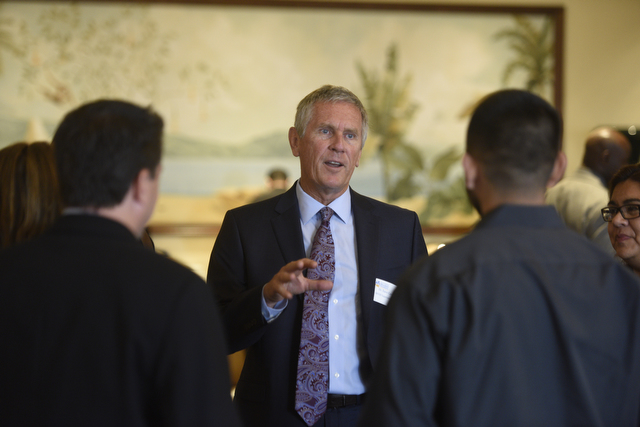David Cash Delivers State of Our Schools
Talks High Dropout Rate, Tech Advances, New Teaching Standards

The dropout rate among students across Santa Barbara Unified School District is nearly one out of 10, a number superintendent David Cash described as “horrible” at his recent State of Our Schools address. Cash also lamented the stark inequity between elementary schools countywide, where budgets range widely between $8,000 per student on the low end and as much as $24,000 per student on the upper. However, those sobering statistics were among the very few pieces of bad news Cash delivered at the $45-per-plate breakfast held earlier this month at the DoubleTree Resort and hosted by the Santa Barbara Education Foundation.
Mostly, Cash was upbeat, focusing on technology advancements in the classroom, ongoing transitions to new teaching standards, and the district’s effort to become what he called “culturally proficient.” On this latter point, he explained that an ideal teacher is one who has grown up in Santa Barbara and speaks Spanish. At the same time, he pointed out that 1,017 students became “English proficient” last year, up from 377 the year before. On top of that, SAT scores topped 1600, bettering the statewide average of 1487. Meanwhile, critics contend Cash failed to talk about lackluster reading levels and challenges associated with special education.
A free State of Our Schools presentation and Q&A will take place at 6 p.m., October 20, at Franklin Elementary.
In related news, Nancy Weiss, the district’s food services director, received the Golden Carrot Award from the Physicians Committee for Responsible Medicine. Since taking over in 2008 — and with help from the Orfalea Foundation — Weiss has transformed the food program from a doling out of highly processed heat-and-serve meals to an offering of made-from-scratch dishes of fresh and local ingredients. “The once faltering program — which was operating $200,000 in the red prior to Weiss’s arrival — is now thriving financially,” according to a press release. “Since 2010, the program has made a profit every year and now operates fully in the black.”



